初中英语的动词时态主要有五种
初中英语动词时态
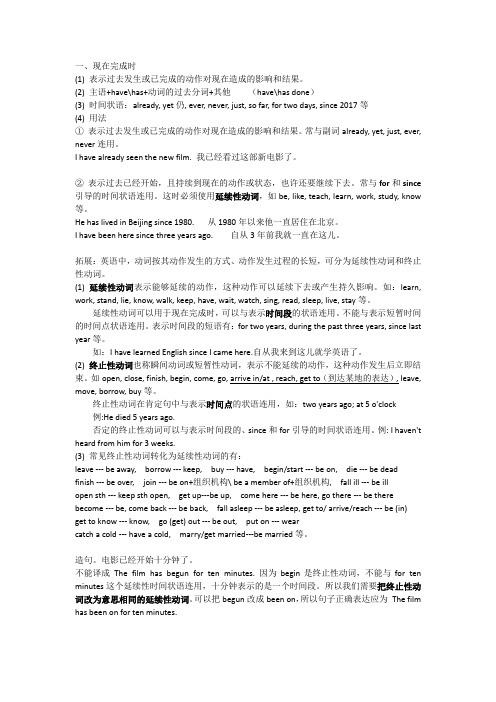
一、现在完成时(1) 表示过去发生或已完成的动作对现在造成的影响和结果。
(2) 主语+have\has+动词的过去分词+其他(have\has done)(3) 时间状语:already, yet仍, ever, never, just, so far, for two days, since 2017等(4) 用法①表示过去发生或已完成的动作对现在造成的影响和结果。
常与副词already, yet, just, ever, never连用。
I have already seen the new film. 我已经看过这部新电影了。
②表示过去已经开始,且持续到现在的动作或状态,也许还要继续下去。
常与for和since 引导的时间状语连用。
这时必须使用延续性动词,如be, like, teach, learn, work, study, know 等。
He has lived in Beijing since 1980. 从1980年以来他一直居住在北京。
I have been here since three years ago. 自从3年前我就一直在这儿。
拓展:英语中,动词按其动作发生的方式、动作发生过程的长短,可分为延续性动词和终止性动词。
(1)延续性动词表示能够延续的动作,这种动作可以延续下去或产生持久影响。
如:learn, work, stand, lie, know, walk, keep, have, wait, watch, sing, read, sleep, live, stay等。
延续性动词可以用于现在完成时,可以与表示时间段的状语连用。
不能与表示短暂时间的时间点状语连用。
表示时间段的短语有:for two years, during the past three years, since last year等。
如:I have learned English since I came here.自从我来到这儿就学英语了。
初中英语动词时态分类和经典例句
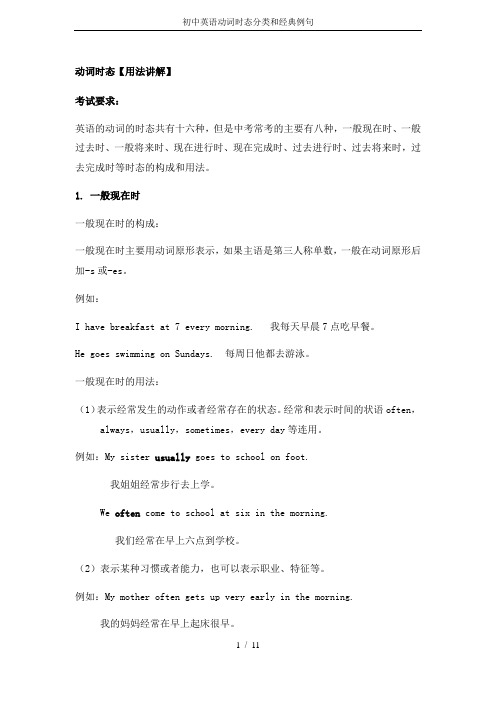
动词时态【用法讲解】考试要求:英语的动词的时态共有十六种,但是中考常考的主要有八种,一般现在时、一般过去时、一般将来时、现在进行时、现在完成时、过去进行时、过去将来时,过去完成时等时态的构成和用法。
1. 一般现在时一般现在时的构成:一般现在时主要用动词原形表示,如果主语是第三人称单数,一般在动词原形后加-s或-es。
例如:I have breakfast at 7 every morning. 我每天早晨7点吃早餐。
He goes swimming on Sundays. 每周日他都去游泳。
一般现在时的用法:(1)表示经常发生的动作或者经常存在的状态。
经常和表示时间的状语often,always,usually,sometimes,every day等连用。
例如:My sister usually goes to school on foot.我姐姐经常步行去上学。
We often come to school at six in the morning.我们经常在早上六点到学校。
(2)表示某种习惯或者能力,也可以表示职业、特征等。
例如:My mother often gets up very early in the morning.我的妈妈经常在早上起床很早。
This kind of car runs very fast.这种小汽车跑得非常快。
(3)表示客观事实、客观规律或者客观真理。
例如:This kind of trees never grows in the desert.这种树从来不在沙漠里生长。
Do you know that knowledge is power?你知道知识就是力量吗?(4)在时间、条件、让步等状语从句中,表示将来的动作。
例如:They’ll be so happy when I tell them.我告诉他们时,他们会很高兴的。
If you aren’t here on time tomorrow, I’ll write to your parents.如果你明天不准时到,我就给你父母亲写信。
初中英语五种时态讲解
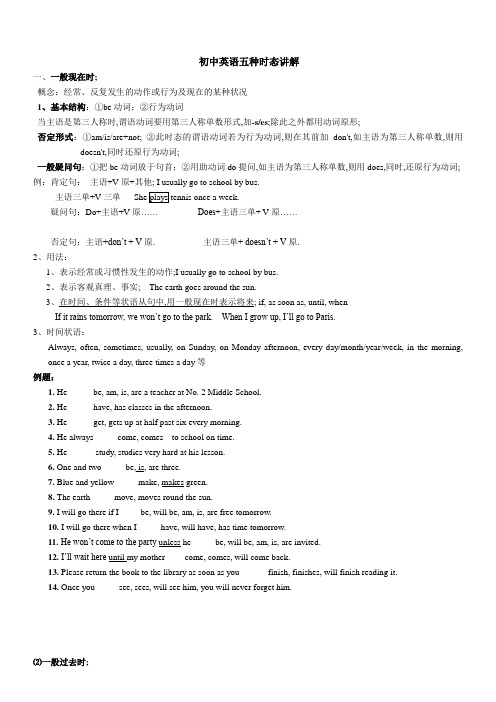
初中英语五种时态讲解一、一般现在时;概念:经常、反复发生的动作或行为及现在的某种状况1、基本结构:①be动词;②行为动词当主语是第三人称时,谓语动词要用第三人称单数形式,加-s/es;除此之外都用动词原形;否定形式:①am/is/are+not; ②此时态的谓语动词若为行为动词,则在其前加don't,如主语为第三人称单数,则用doesn't,同时还原行为动词;一般疑问句:①把be动词放于句首;②用助动词do提问,如主语为第三人称单数,则用does,同时,还原行为动词; 例:肯定句:主语+V原+其他; I usually go to school by bus.主语三单+V三单疑问句:Do+主语+V原…… Does+主语三单+ V原……否定句:主语+don’t + V原. 主语三单+ doesn’t + V原.2、用法:1、表示经常或习惯性发生的动作;I usually go to school by bus.2、表示客观真理、事实; The earth goes around the sun.3、在时间、条件等状语从句中,用一般现在时表示将来; if, as soon as, until, whenIf it rains tomorrow, we won’t go to the park. When I grow up, I’ll go to Paris.3、时间状语:Always, often, sometimes, usually, on Sunday, on Monday afternoon, every day/month/year/week, in the morning, once a year, twice a day, three times a day等例题:1. He______be, am, is, are a teacher at No. 2 Middle School.2. He______have, has classes in the afternoon.3. He______get, gets up at half past six every morning.4. He always _____come, comes to school on time.5. He ______study, studies very hard at his lesson.6. One and two _____be, is, are three.7. Blue and yellow _____make, makes green.8. The earth _____move, moves round the sun.9. I will go there if I ____ be, will be, am, is, are free tomorrow.10. I will go there when I _____have, will have, has time tomorrow.11. He won’t come to the party unless he _____be, will be, am, is, are invited.12. I’ll wait here until my mother ____come, comes, will come back.13. Please return the book to the library as soon as you ______finish, finishes, will finish reading it.14. Once you _____see, sees, will see him, you will never forget him.⑵一般过去时;1、⑴表示过去某个时间发生的动作或存在的状态; I got up late this morning.⑵表示过去的习惯或经常发生的动作;When I was in the countryside. I often swam in the river. I used to go fishing.2、结构:基本结构:①be动词;②行为动词否定形式:①was/were+not; ②在行为动词前加didn't,同时还原行为动词;一般疑问句:①was或were放于句首;②用助动词do的过去式did 提问,同时还原行为动词;例:肯定句:主语+ V过去+其他;疑问句:Did+主语+ V原……否定句:主语+didn’t+ V原3、动词的规则变化;4、时间状语:Yesterday, last night/week/year/month, last Sunday, in 1995, the other day, just now, ago等例题:1. He____be, was, were, been here a moment ago.2. They ____be, was, were, been here just now.3. The scientists _____leave, leaves, leaved, left for America yesterday.4. Last week we ______visit, visited the Science Museum.5. When I was a child, I often ____play, played football.6. The students ran out of the classroom as soon as the bell ____ring, rang, rung.⑶一般将来时;①肯定句:否定句:注:当主语为I 或we时,问句中可用shall where shall we meet tomorrow②be going to+ V原表示计划、打算做某事;用来表示近期或事先考虑过的将要发生的动作以及已有迹象表明必将发生某事,意为“打算;就要”; be going to do 将要干某事---what are you going to do next Sunday ---I am going to listen to music.Look at the clouds, there is going to rain.③现在进行时be +Ving 有时可以表示将来;常用这种结构的动词:go, come, leave, stay, start, arrive We’re leaving for London.例题:1 . _____you ____a doctor when you grow upA .Will; going to be B. Are; going to be C. Are; / D .Will; be2. I don’t know if his uncle _____. I think he _____ if it doesn’t rain.A will come; comesB will come; will comeC comes; comesD comes; will come3 . He will be back _____a few minutes.A withB forC onD in4. What time _____we meet at the gate tomorrowA willB shallC doD are5. He will have a holiday as soon as he _____the work next week.A finishes B. doesn’t finish C will finish D won’t finish6 .There _____some showers this afternoon.A will beB will haveC is going to beD are going to have7. It ____my brother’s birthday tomorrow. She _____a party.A is going to be; will haveB will be; is havingC will be; is going to haveD will have; is going to be8. Li Ming is 10 years old now, next year he _____11.A isB is going to beC will beD will to be与will区别:两者都可表示将要发生的事、将要去做某事,但它们有如下几点区别:1. 表示近期、眼下就要发生的事情,will 表示的将来时间则较远一些,如:He is going to write a letter tonight.He will write a book .2. 表示根据主观判断将来肯定发生的事情,will表示客观上将来势必发生的事情;He is seriously ill. He is going to die.He will be twenty years old.3. be going to 含有“计划,准备”的意思,而will 则没有这个意思,如:She is going to lend us her book.He will be here in half an hour.4.在有的主句中,一般不用be going to, 而多用will, 如:If any beasts comes at you, I'll stay with you and help you4现在进行时1、构成:肯定句:主语+ is / am / are +ving疑问句:Is /Am /Are + 主语+ving否定句:主语+ isn’t / am not / aren’t + ving2、用法:①表示正在进行的动作I’m reading book now.②表示现阶段正在进行的动作或状态; They are studying hard this term.3、时间状语:now , these days, 当句中有look, listen , can’t you see, can you see时Listen He is singing.例题:1. I ____write, am writing, is writing, are writing a letter now.2. Look, it _____begin, is beginning, am beginning, are beginning to rain.3. They ____study, is studying, am studying, are studying medicine at the Medical Institute of Chengde these days.4. He _____teach, am teaching, is teaching, are teaching an English lesson at this time.5 过去进行时1、结构was / were + doing2、用法①表示过去某段时间正在进行的动作---what were you doing at 9:30 last night --- I was watching TV.3、when一般接一般过去时I was doing my homework whenwhile一般接进行时WhileHe was playing basketball while she was reading books.例题:1. I _____cook, cooked, was cooking, were cooking breakfast when you arrived.____you_____ do, did, was...doing, were…doing at this time yesterday eveninghave, are having, had, were having dinner when the doorbell rang.When/ As we____ have, had, are having, were having dinner, the doorbell rang.动词基本变化形式:。
初中英语的时态知识点总结
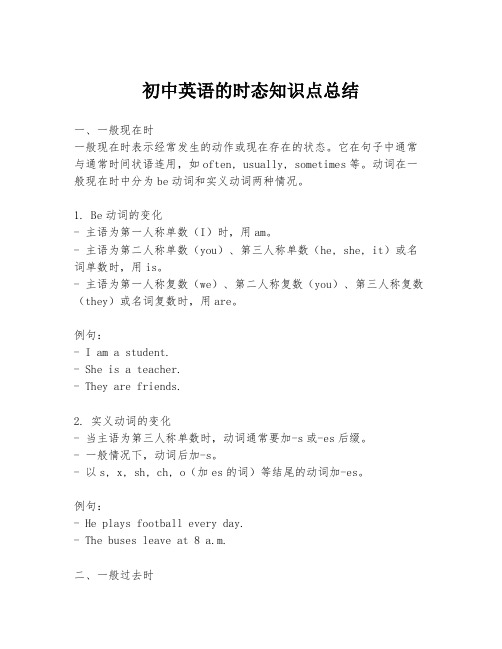
初中英语的时态知识点总结一、一般现在时一般现在时表示经常发生的动作或现在存在的状态。
它在句子中通常与通常时间状语连用,如often, usually, sometimes等。
动词在一般现在时中分为be动词和实义动词两种情况。
1. Be动词的变化- 主语为第一人称单数(I)时,用am。
- 主语为第二人称单数(you)、第三人称单数(he, she, it)或名词单数时,用is。
- 主语为第一人称复数(we)、第二人称复数(you)、第三人称复数(they)或名词复数时,用are。
例句:- I am a student.- She is a teacher.- They are friends.2. 实义动词的变化- 当主语为第三人称单数时,动词通常要加-s或-es后缀。
- 一般情况下,动词后加-s。
- 以s, x, sh, ch, o(加es的词)等结尾的动词加-es。
例句:- He plays football every day.- The buses leave at 8 a.m.二、一般过去时一般过去时表示过去某一确定时间发生的动作或存在的状态。
动词在一般过去时中要变为过去式,一般在词尾加-ed。
1. 规则变化- 动词词尾加-ed(如:played, visited)。
- 以e结尾的动词加-d(如:lived, danced)。
- 以辅音字母+y结尾的动词,变y为i再加-ed(如:studied, copied)。
2. 不规则变化不规则动词的过去式变化没有固定规则,需要特别记忆。
例如:- go去了went。
- eat吃了ate。
- begin开始began。
三、一般将来时一般将来时表示将来某一时间会发生的动作或状态。
它的构成主要有以下几种方式。
1. 将will或shall加在动词原形之前。
- I will go to school tomorrow.- He shall finish the work.2. 用“be going to + 动词原形”表示计划或打算做的事情。
初中英语动词时态分类及例句
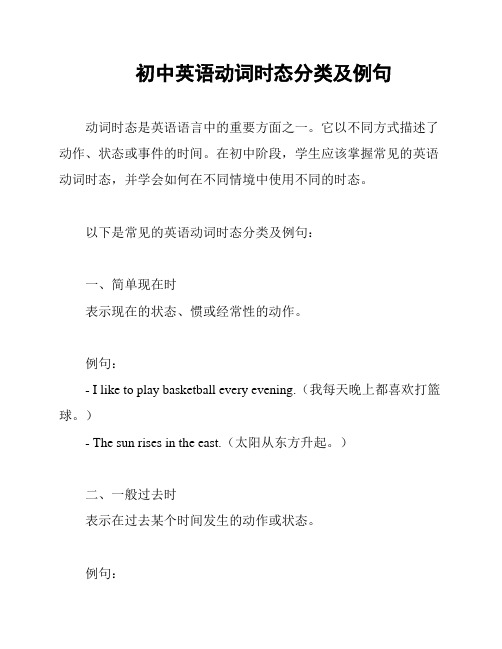
初中英语动词时态分类及例句动词时态是英语语言中的重要方面之一。
它以不同方式描述了动作、状态或事件的时间。
在初中阶段,学生应该掌握常见的英语动词时态,并学会如何在不同情境中使用不同的时态。
以下是常见的英语动词时态分类及例句:一、简单现在时表示现在的状态、惯或经常性的动作。
例句:- I like to play basketball every evening.(我每天晚上都喜欢打篮球。
)- The sun rises in the east.(太阳从东方升起。
)二、一般过去时表示在过去某个时间发生的动作或状态。
例句:- He walked to school yesterday.(昨天他步行去学校了。
)- I visited my grandparents last summer.(我去年夏天拜访了我的祖父母。
)三、现在进行时表示现在正在进行的动作。
例句:- They are watching a movie now.(他们现在正在看电影。
)- She is studying in the library at the moment.(她现在正在图书馆研究。
)四、过去进行时表示过去某个时间正在进行的动作。
例句:- She was teaching in the classroom at 2 pm yesterday.(昨天下午2点她正在教室里上课。
)- I was studying when he called me.(他给我打电话的时候我正在研究。
)五、将来时表示将要发生的动作或状态。
例句:- They will go to Beijing next week.(他们下周将去北京。
)- I am sure she will like the present.(我确信她会喜欢这个礼物。
)六、过去完成时表示过去某个时间之前已经完成的动作。
例句:- She had finished her work by 5 pm.(下午5点她已经完成了她的工作。
(完整版)英语常用的八种时态
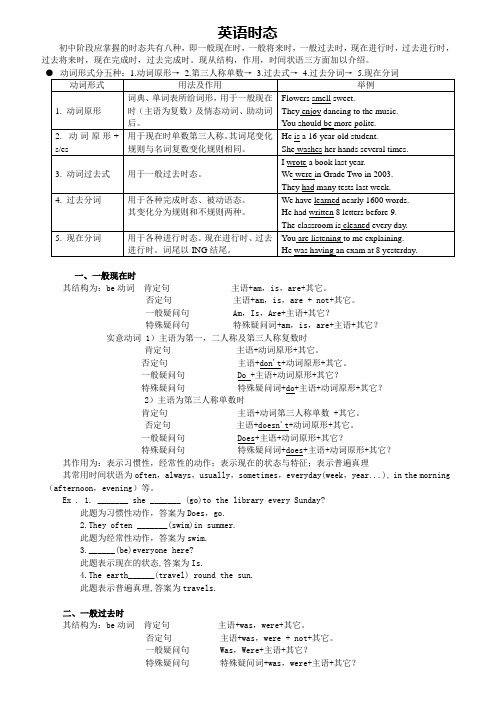
英语时态初中阶段应掌握的时态共有八种,即一般现在时,一般将来时,一般过去时,现在进行时,过去进行时,过去将来时,现在完成时,过去完成时。
现从结构,作用,时间状语三方面加以介绍。
一、一般现在时其结构为:be动词肯定句主语+am,is,are+其它。
否定句主语+am,is,are + not+其它。
一般疑问句 Am,Is,Are+主语+其它?特殊疑问句特殊疑问词+am,is,are+主语+其它?实意动词1)主语为第一,二人称及第三人称复数时肯定句主语+动词原形+其它。
否定句主语+don't+动词原形+其它。
一般疑问句 Do +主语+动词原形+其它?特殊疑问句特殊疑问词+do+主语+动词原形+其它?2)主语为第三人称单数时肯定句主语+动词第三人称单数 +其它。
否定句主语+doesn't+动词原形+其它。
一般疑问句 Does+主语+动词原形+其它?特殊疑问句特殊疑问词+does+主语+动词原形+其它?其作用为:表示习惯性,经常性的动作;表示现在的状态与特征;表示普遍真理其常用时间状语为often,always,usually,sometimes,everyday(week,year...), in the morning (afternoon,evening)等。
Ex . 1. _______ she _______ (go)to the library every Sunday?此题为习惯性动作,答案为Does,go.2.They often _______(swim)in summer.此题为经常性动作,答案为swim.3.______(be)everyone here?此题表示现在的状态,答案为Is.4.The earth______(travel) round the sun.此题表示普遍真理,答案为travels.二、一般过去时其结构为:be动词肯定句主语+was,were+其它。
英语动词有五种基本形式和八大时态

英语动词有五种根本形式:动词原形,第三人称单数〔一般现在时〕,过去式,过去分词和现在分词。
1. 动词原形。
指的是使用动词本身的形态,即与助动词或情态动词一起构成谓语的动词时,要用原形。
例:I must wait for her.2. 第三人称单数。
在英语中,第三人称单数指的是“他〞、“她〞、“它〞,还有单个人/物的名称,如Mary, John, My father, her book等,后面的动词要用“三单〞形式。
例:She es from America.3. 过去式。
过去式是英语时态的一种,表示过去某个时间里发生的动作或状态。
动词的过去式分为规那么动词过去式和不规那么动词过去式。
yesterday.4. 过去分词。
过去分词表示“过去的过去〞,表示动作在过去某个时间之前就已经发生了,一般用于现在完成时和过去完成时中。
例:I have seen the movie before.5. 现在分词。
现在分词也就是动词的ing形式,它是非谓语动词的一种。
例:She sat there reading a novel.英语八大时态英语的时态〔tense〕是一种动词形式,不同的时态用以表示不同的时间与方式。
下面就英语中常见的八种根本时态进展阐述,其它的时态都是在这八种时态的根底上结合而成的。
一、一般现在时:1.概念:经常、反复发生的动作或行为及现在的某种状况。
2.时间状语:always, usually, often, sometimes, every week (day, year, month…), once a week, on Sundays,3.根本构造:动词原形〔如主语为第三人称单数,动词上要加〔e〕S〕4.否认形式:am/is/are+not;此时态的谓语动词假设为行为动词,那么在其前加don't,如主语为第三人称单数,那么用doesn't,同时复原行为动词。
5.一般疑问句:把be动词放于句首;用助动词do提问,如主语为第三人称单数,那么用does,同时,复原行为动词。
初中英语知识归纳总结——动词的时态

初中英语知识归纳总结——动词的时态动词的时态(一)教学重点一般现在时在英语中,不同时间里以不同方式发生的动作或存在的状态,要用不同的动词形式来表示,动词的这种不同形式称为动词的时态。
时态从时间上划分,可分为四大类:现在时;过去时;将来时;过去将来时。
从行为上,每一类可以分为四种形式:一般式;进行式;完成式;完成进行式。
这样英语的动词合起来,总共有十六种时态,初中只需掌握其中的八种时态。
1、一般现在时(1)一般现在时表示现在的状态、习惯性的动作或主语所具备的性格和能力等。
①当动词是be时,第一人称用am,第二人称用is,其他人称用are.②当动词是实义动词时,一般用动词原形,但如果主语是第三人称单数时,动词必须用第三人称单数形式,其变化规则如下:助动词do(第三人称单数用does)构成否定句、疑问句及答语,但要注意助动词后原来的谓语动词要恢复原形。
例如:I like music.I don’t like music.Do you like music?Yes, I do No, I don’t(2)一般现在时的用法①表示经常、习惯性动作,常和often, usually, every day, sometimes, always 等时间状语连用。
如:He goes to school by bus every day.They often play football②表示能力、职业、特征。
如:Miss Gao teaches English.Do you speak Japanese?③表示客观存在。
如:The earth moves round the sun.Time and tide wait for no man.④表示已经安排好或计划好的事。
如The plane takes off at 7:30.Classes begin at 8:00⑤在时间状语和条件状语从句中,主句用一般将来时,从句用一般现在时。
- 1、下载文档前请自行甄别文档内容的完整性,平台不提供额外的编辑、内容补充、找答案等附加服务。
- 2、"仅部分预览"的文档,不可在线预览部分如存在完整性等问题,可反馈申请退款(可完整预览的文档不适用该条件!)。
- 3、如文档侵犯您的权益,请联系客服反馈,我们会尽快为您处理(人工客服工作时间:9:00-18:30)。
初中英语的动词时态主要有五种:一般现在时,一般过去时,一般将来时,现在进行时,现在完成时.1. 一般现时的用法:主要由动词原形表示,但在第三人称单数时要在词尾加-s 。
否定句和疑问句要用助动词do, does.A. 经常性或习惯性的动作。
如The trees get green in spring . 。
B现在特征或状态。
如The Changjiang River is the longest in our country.He doesn` t work in the factory .C.普遍真理。
如The sun rises in the east . Five and two in seven .2现在进行时:现在进行时是由助动词be 的人称形式加现在分词构成。
主要表示现在或现阶段正在进行的动作。
如:Where are they swimming? They are swimming in the river.有些动词的现在进行时表示近期按计划或安排要进行的动作。
这些动词是:go ,come, leave ,start ,arrive , return ,work sleep,stay,play,do,have ,wear…..She is coming to see me tomorrow.3.一般将来时:主要表示将要发生的动作或情况。
由助动词shall 或will加动词原形构成。
/ be going to 加动词原形构成It won’t rain tonight .I shall meet you at the station.He is going to have a swim tomorrow.4.一般过去时:由动词的过去式表示。
表示在过去某个时刻发生的动作或情况。
包括过去习惯性动作。
如;Did you knock at the door just now? / He finished reading the book yesterday.5.现在完成时:由have的人称形式加过去分词构成A 到现在为止已经完成的动作。
如:I have lent my book to Ann. 我把书借给了安。
He has never seen a real tiger. 他从来没有见过真老虎。
B、从过去开始延续到现在的动作或状态。
如:She has lived here since 1991. 从一九九一年起她就住在这里。
时态常用的时间副词一般现在时every( year,otherday ,twodays,week,month…) ,often ,always,usually ,sometimes, in the morning,in summer,on Sunday一般过去时 last week, just now,yesterday, yeaterday morning ,the day before yesterday,then,at that moment,(a few days) ago,一般将来时 tomorrow, next month, in two days,现在进行时 now现在完成时 since ,for(one year….), just, already, yet ,in the last five years, …before.so far被动语态:被动语态表示主语是动作的承受者。
由“助动词be+及物动词的过去分词”构成。
Be有人称,数量和时态变化。
一般现在时:be (is am are) +及物动词的过去分词一般过去时:be (was were)+ 及物动词的过去分词情态动词的过去分词:情态动词+be +及物动词的过去分词用动词的适当时态填空:1. Light_________(travel)faster than sound. He _______(get) up early in the morning2. John usually ________(go) home on Sunday morning.3. Cats ________(like ) fish while dogs _______ (like ).4. He always__________(sleep) with his windows open.5. One tree ___________(not make) a wood. Two and three_______(be ) five .6. I ______(say ) you are wrong. Everything _______(go )well in spring .7. He_________(not wok) on Sundays. He _______(take) a walk after supper.8. Lucy ________(prefer) coffee to milk. Lily ________(hate) traveling.9. Children _______(love ) to play games. The boy _____(look ) like his mother.10. The sun _______(rise ) in the east and ______(go) down in the west.11. Where ______you ______(go ) just now? I _______(go) to the library.12. He______(live) in China last year, but he ________(live) in Japan now. He_________(live )therefor three months. He ________(live) there by the end of this year.13. He _______(pay) ten yuan for his new book yesterday. It ______(cost) him so little.14. What _____you _____(wear )yesterday? I _______(wear ) a blue skirt.15. He ______(feel ) very tired last night ,he ____(fall) asleep very quickly .16. He______(say )he ______( will)write to me as soon as he came home.17. He ______(take )his temperature half an hour ago.18. We ________(win ) the league match last week, we ______(be ) the winners.19. She ______(keep)me waiting for an hour last night . She ______(be )late.20. He ______(find )it difficult to get to sleep. because he _______(be)too glad.21. He ________(read ) a book when I ______(see) her .22. Great changes _______(happen ) in the village last year.23. He ____(drive ) to Shanghai last week, he ________(choose )many presents for his family.24. Just now ,he ______(mistake ) me for Lucy.25. What ______you _____(do )now ? I ________(look) for my pen .26. Look ,they ______(read)over there,others _______(dance)under the tall tree.27. Listen ,someone___________(sing)English songs next room.28. It’s five o’clock. . I________(do )my homework, My brother__________(play)games , my mother _________(cook) supper, my father ________(mend ) his car in the garden.29. Tom __________(fly ) kites with his classmates on the hill now.30. Who ____________(wash ) clothes over there ? It’s my mother.31. ______you _______(look ) for a ball? Yes .I am .32. He _______always _______(try )out his new ideas.33. The world population __________(grow ) faster and faster .34. What _______Lucy _________(wear) today ? She _______(wear)a dark blue skirt.35. ______you _______( make )a cake ? No . I__________(make) dumplings.36. It________(rain )hard now. If it_________(not stop ) ,we________(not go )to the park.37. The children ________(go )the park next week.They ________(have )a good time there.38. He with his father _________(play)football tomorrow .39. My friend _________ (come) to see me in two days.40. What ______you _______(do )this Sunday ? Nothing much . ______we______( go )shopping?That’s a good idea. When ______we ______(meet) ?41. There __________(be )a football match the day after tomorrow.42. Jim __________(have ) a swim this evening. After that ,he ________(do )hishomework.43. ClassThree __________(not have )any classes next week.44. I________(buy )a skirt for my daughter next month.45. _______you_______(start)your homework? Yes, but I_________(not finish) it yet.46. What ________you________(do )with the library book? I_____just _______(return)it .47. Excuse me . I ________(lose ) my cat. _____you ______(see) it anywhere?48. If I _______(lose )the book, I must pay for it.49. I_______( come )to get my pan back. . ______you _______( finish)using it? Not yet.50. _____you ever _______(milk) a cow? No, never.51. How long _____you ______( be) at this school ? For two years.52. He ________(teach ) in this school for ten years . I_________( live )here since last year.53. More than two days ________(pass) since we left.54. _______you ______(take )her temperature? Yes, I have. I_______(have)a cold for a week.55. _______you _______(sleep )well? Yes, I ______(sleep)well all night.56.I_______ never________(hear)of that before.56. Chinese _________(speak ) by the largest people in the world.57. This bike _______(make ) in Shanghai .Bananas_________(grow )in the south of China.58. Metal _________(use)for making machines.59. Sheep _________(keep) farmers for producing wool and mutton.60. The watch _________(buy) two years ago . It _________(buy) for two years.61. The bike _________(use ) for ten years. It ________(break )down for two months.62. ______you ______(wear )it a lot ? Yes . It _______(wear ) for ten years.63. The young tree must __________(tie ) to the stick.64. Trees should __________(plant ) in spring .65. Silk ________(produce ) in Suzhou.66. Some of the things ________(show ) in the museum now .67. The PRC _________(found)on October 1,1949.68. The lost boy _______(find ) yesterday.69. The book _________(write ) in English It can __________(read ) by many people.70. Old people should ___________(speak )to politely .71. The teacher should ____________(listen ) to carefully.72. She _________(surprise ) at the news just now.73. She __________(see)to run into the room by me five minutes ago.74. The ground _________(cover) with snow in winter.75. Fruit should __________(harvest) at the right time.76. There are twenty more trees to___________(plant).77. He ________(mistake ) for Jim by the man yesterday.78. Great changes_________(happen ) in the village since 1985.79. The cheapest pen ________(choose ) by him at last .80. The car must ___________(drive ) slowly by old men.综合练习:1. The girl _____(draw ) a co on the blackboard with chalk now.2. When_____ you ______(lose ) the book?3. How many times ______your uncle ____ (be )to Dalian ? Twice4. The girl always _______(prefer) Chinese to maths .5. The girl _______(learn )to milk since last year .6. –What`s the girl crying for? --- She ______(cut) her finger.7. Stop ______.(guess). Mrs Hu has told me who won the high jump.8. The dog often ____(follow)the young man everywhere.9. Can you _______(guess) it isn`t his ?10. Hurry up, or you(catch)______ the train .11. Rechard ________(give) you a call as soon as you comes back.12. The little boy hurt his head . He _____(need) an operation at once.13. Don`t worry. We _______(send) for the policemen.14. My radio _______ (break).I can`t listen to it.15. Robert lay quietly while the doctors ________ (operate) on him.16. Don`t worry .They_______ (take) good care of your sin if you go to save the soldiers.17. Most people _______(hate) the bad weather.18. The spy ________ (cover) the blanks while the policemen came in .19. Don`t go to see him . He _________(change) his mind .20. Jim ______ (make) a few friends since he came to China.21. Don`t worry. The foreign children _______ (get ) on well on well with their classmates.22. Who _______(wear) the sweater outside last night?23. Look. You brother ________(fight) with John.24. _______ the door ______ ?(lock)25. Glasses _________ (make)of glass .26. Silk _______(sell) in some shops in the town..27. The factory _________(produce) machines.28. Do you know the Frenchman/ Yes , I__________(know ) him for two years.29. The farmers often _________( sell) their vegetables in the market.30. How many televisions ___________(make ) in the factory last week?31. Athermos is used for _________(keep ) the water hot.32. Can the motorbike _________?(ride)33. The old woman __________ (lock ) the box when she goes out .34. Don’t be afraid . The dog must _________(tie ) to the tree.35. All the new words __________(not look ) up in the dictionary yet .36. How many babies __________(bear) in the world every yea r”37. The woman _______(have ) ababy this morning.38. The shoes in your size __________(sell) out.39. Jack fell over while he ______(pass0 the stick on to the second runner.40. Sorry , I kept you ________(wait) so long.41. The boy is always made ________(wash ) his face in the morning.42. What _______(be) the population in the world by the end of this century?43. Mr Brown has stopped smoking since he ________(operate ) on ?44. Tom said he ______(be) a teacher when he grew up.45. His jacket _______(wear ) out . He wants to buy a new one .46. The woman _______(seem)always angry.47. Will you go to see the film? Thanks, but _________(see) it ?48. Miss Li ________(be ) Washington for one and a half years.49. When will you finish ______the book ?(write )50. I ______(leave ) my pen in the bedroom . I have to write with a pencil.51. Stop talking . The headmaster _________(come).52. The book can ________(keep) for two weeks.53. After supper she went on _________(do) her homework.54. It was a cold night . An old man _______(lie) under a chair in the park.55. Doctors _________(need ) in every part of the world.56. She ______(say ) she works in an office.57. His father ________(die ) for two months .58. By the end of this month , Bill ________(catch) up with Bruce.59. Why _______you always ______(follow) me?60. The girl _______(hurry ) off just now .61. How much ________you _______(spend) on the next travel ?62. Mr Brown _______(come) in ten minutes63. All the children ________(take ) good care of in the school.64. I ________(go ) with you if you agree with me .65. What _______(happen ) at the corner of the street now?66. The young man was very lazy , so he ________(send ) away .67. The woman ________(not hear ) from her husband since last April .68. The boy was sad because his team _______(beat ).69. Two of the players _____ (hurt ) while playing football.70. Please go and see a film with me when you ______ (finish)71. How soon _____ you ______ (go ) again to Chengdu?72. Could you tell me what _______ (grow ) in the South ?73. His little sister ______ still _____ (sleep ) when he ______ (get ) up yesterday.74. I`ll pass the message on to Luny as soon as I ________ (see ) her next week .75. Mum _______ (have ) supper at six every evening.76. What ______ this _____ (call ) in English ?77. Do you feel like ______ (walk ) to the corner with me ?78. Each of the pupils _______ an hour to finish the paper yesterday.( give )79. Your uncle _____ under the tree , isn`t he ? (lie )80. He asked me if it _______ (rain ) the next morning.81. You`d better _______ (go )to see a doctor.82. We ______ (learn ) over ten English songs by the end of last term.83. The team ______ (choose ) yesterday afternoon.84. He doesn`t let us ________(draw ) on the wall .85. I like _______ (read ) in bed .86. It ______ (get ) late , I must go home .87. Neither of us _______ ( have ) much time .88. It gets too hot for _______ ( climb)89. His mother ______ (be ) a nurse for nearly ten years .90. Be quite ! The baby ______ ( sleep ).91. A new bridge _______ ( build ) in the park last year .92. Lucy ______ ( do)her home work . You`d better _____ (turn )off the TV set .93. I _____ (see ) him yesterday .94. Her sister ______ (learn ) to draw since she was four .95. A woman _______ ( see )go into the boy`s room .96. I _______ (call ) you as soon as I get to Beijing.97. I don`t know when she ______ ( return ) ,but when she _____ ( return ).98. If there ______ (be ) no water ,there _____ (be ) no living things on the earth .99. I ______ ( receive ) a letter yesterday . It ( write ) by my brother .He _______ (stay ) in Hainan. He _____ ( be ) there for nearly a year . In his letter , he _____ (say ) he _____ (return ) to Xuzhou the next month . If he _________ (come ) back ,he ______ (leave ) . And a new theatre _____ (build ) near our home . It _____ (finish ) in two weeks. 100. My friend Li _______ (get ) a watch . He _______ (have ) it for two years . It_____(make ) in a town . He _______ (buy ) it in a street market and ______ (wear) it to school almost every day . But he ________ (like ) it . It _______ (have ) often ______ (break ) down . He would like a better one . Next time he ______ (buy ) one from a shop .宾语从句:宾语从句在复合句中作主句的宾语。
